|
 Secure Site
Secure Site
|
 |
Archive for the 'mindfulness practice' Category
 Yoshida, "Plum" woodblock print Moon, plum blossoms,
this, that,
and the day goes.
-Issa-
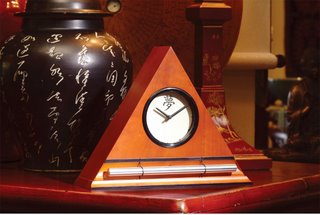 Zen Alarm Clock with Chime and Dream Kanji Dial Face
Now & Zen
1638 Pearl Street
Boulder, CO 80302
Posted in Chime Alarm Clocks, Japanese Inspired Zen Clocks, Meditation Tools, mindfulness practice, Natural Awakening, Now & Zen Alarm Clocks, Progressive Awakening, Well-being, Yoga Timer, Zen Timers
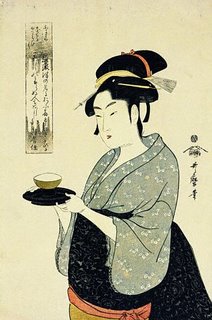 Kitagawa Utamaro Ukiyo-e, wabi-cha Wabi-cha, or wabi-tea, is a style of Japanese Tea Ceremony particularly associated with Sen no Rikyu and Takeno Joo before him. Wabi-cha emphasizes simplicity. The term came into use in the Edo era (1603 to 1868), prior to which it was known as wabi-suki, suki generally referring to the concept of “artistic inclination,” and “wabi” literally meaning ‘forelorn’.
adapted from wikipedia.org
 Zen Chime Clock with Japanese Maple Leaves in Honey Finish Now & Zen
1638 Pearl St.
Boulder, CO 80302
Posted in Bamboo Chime Clocks, Chime Alarm Clocks, Japanese Inspired Zen Clocks, Meditation Timers, Meditation Tools, mindfulness practice, Natural Awakening, Now & Zen Alarm Clocks, Progressive Awakening, Yoga Timer, Yoga Timers by Now & Zen, Zen Timers
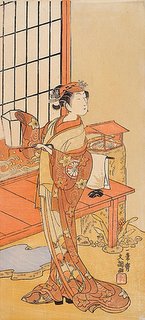 Ukiyo-e by Ippitsusai Buncho of the actor Segawa Kikunojo Iki is a traditional aesthetic ideal in Japan. Iki, having emerged from the worldly Japanese merchant class, may appear in some ways a more contemporary expression of Japanese aesthetics than concepts such as wabi-sabi. The term is commonly used in conversation and writing, but is not necessarily exclusive of other categories of beauty.
Iki is an expression of simplicity, sophistication, spontaneity, and originality. It is ephemeral, romantic, straight forward, measured, audacious, smart, and unselfconscious.
Iki is not overly refined, pretentious, complicated, showy, slick, coquettish, or, generally, cute. At the same time, iki may exhibit any of those traits in a smart, direct, and unabashed manner.
Iki may signify a personal trait, or artificial phenomena exhibiting human will or consciousness.
Iki is not used to describe natural phenomena, but may be expressed in human appreciation of natural beauty, or in the nature of human beings.
Murakami Haruki (b.1949), who writes in a clear, unflinching style–at turns sentimental, fantastic, and surreal–is described as embodying iki. In contrast, Kawabata Yasunari (1899-1972) writes in a more poetic vein, with a closer focus on the interior “complex” of his characters, while situations and surroundings exhibit a kind of wabi-sabi. That said, stylistic differences may tend to distract from a similar emotional subjectivity. Indeed, iki is strongly tied to stylistic tendencies.
adapted from wikipedia.org
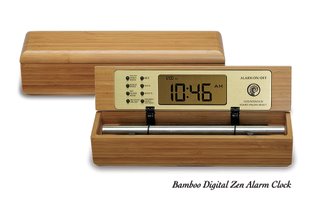 Bamboo Digital Chime Clock, for a progressive awakening
Now & Zen
1638 Pearl Street
Boulder, CO 80302
Posted in Bamboo Chime Clocks, Japanese Inspired Zen Clocks, Meditation Timers, Meditation Tools, mindfulness practice, Natural Awakening, Progressive Awakening, Zen Timers
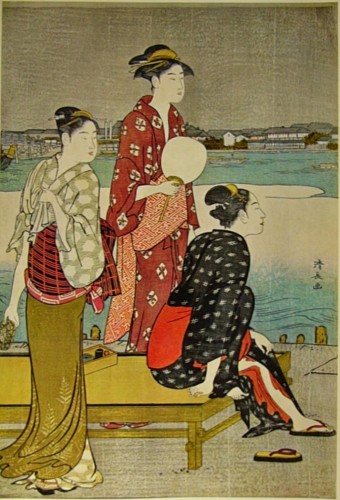 Kiyonaga Riverside Ukiyo-e The phrase iki is generally used in Japanese culture to describe qualities that are aesthetically appealing and when applied to a person, what they do, or have, constitutes a high compliment.
Iki is not found in nature. While similar to wabi-sabi in that it disregards perfection, iki is a broad term that encompasses various characteristics related to refinement with flair.
The tasteful manifestation of sensuality can be iki.
Etymologically, iki has a root that means pure and unadulterated. However, it also carries a connotation of having an appetite for life. Iki is never cute.
The basis of iki is thought to have formed among urbane commoners (chonin) in Edo in the Tokugawa period (1603 to 1868). Iki is sometimes misunderstood as simply “anything Japanese”, but it is actually a specific aesthetic ideal, distinct from more ethereal notions of transcendence or poverty. As such, samuri, for example, would typically, as a class, be considered devoid of iki, (see yabo).
At the same time, individualistic warriors are often depicted in contemporary popular imagination as embodying the iki ideals of a clear, stylish manner and blunt, unwavering directness. The term became widespread in modern intellectual circles through the book The Structure of “Iki” (1930) by Kuki Sukuzo.
adapted from wikipedia.org
 Digital Zen Timers, a mindfulness practice tool Now & Zen
1638 Pearl Street
Boulder, CO 80302
Posted in Bamboo Chime Clocks, Beauty, Meditation Tools, mindfulness practice, Natural Awakening, Now & Zen Alarm Clocks, Progressive Awakening, wabi-sabi, Yoga Timer, Zen Timers
 yugen, a profound mysterious sense of the beauty of the universe Yūgen is an important concept in traditional Japanese aesthetics. The exact translation of the word depends on the context. In the Chinese philosophical texts the term was taken from, yūgen meant “dim”, “deep” or “mysterious”. In the criticism of Japanese waka poetry, it was used to describe the subtle profundity of things that are only vaguely suggested by the poems, and was also the name of a style of poetry (one of the ten orthodox styles delineated by Fujiwara no Teika in his treatises).
Yugen suggests that beyond what can be said but is not an allusion to another world. It is about this world, this experience. All of these are portals to yugen:
“To watch the sun sink behind a flower clad hill. To wander on in a huge forest without thought of return. To stand upon the shore and gaze after a boat that disappears behind distant islands. To contemplate the flight of wild geese seen and lost among the clouds. And, subtle shadows of bamboo on bamboo.”
Zeami Motokiyo
Yugen is said to mean “a profound, mysterious sense of the beauty of the universe… and the sad beauty of human suffering”.
adapted from wikipedia.org
 Japanese Maple Leaves Dial Face, the Zen Alarm Clock for a progressive awakening Now & Zen
1638 Pearl Street
Boulder, CO 80302
Posted in Bamboo Chime Clocks, Chime Alarm Clocks, Goodness, Meditation Timers, Meditation Tools, mindfulness practice, Natural Awakening, Now & Zen Alarm Clocks, Progressive Awakening, wabi-sabi, Zen Timers
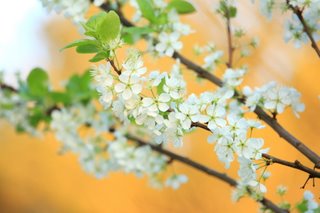 plum blossoms, one of the four noble gentlemen The “Four Gentlemen”, also called the Four Noble Ones or Four Friends, in Chinese art refers to four plants: the orchid, or ran; the bamboo; the chrysanthemum, or kiku; and the plum blossom, or ume (italics are in Japanese). The term compares the four plants to Confucianist junzi, or “gentlemen”. A painting or decoration incorporating all four plants is also known as the “Four Gentlemen”. They are most typically depicted in traditional ink and wash painting. The “Four Gentlemen” belong to the category of bird-and-flower painting in Chinese art.
The Four Gentlemen have been used in Chinese painting since the time of the Chinese Song Dynasty (960–1279) because of their refined beauty, and were later adopted by artists in Korea, Japan, and Vietnam. As they represent the four different seasons (the plum blossom for winter, the orchid for spring, the Chrysanthemum for autumn, and the bamboo for summer), the four are used to depict the unfolding of the seasons through the year.
adapted from wikipedia.org
 Zen Alarm Clock with Chime and Dream Kanji Dial Face Now & Zen
1638 Pearl Street
Boulder, CO 80302
Posted in Bamboo Chime Clocks, Chime Alarm Clocks, Japanese Inspired Zen Clocks, Meditation Tools, mindfulness practice, Natural Awakening, Now & Zen Alarm Clocks
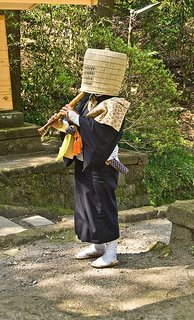 A Buddhist monk begging as a komusō A komusō, was a Japanese begging monk of the Fuke school of Zen Buddhism, during the Edo period of 1600-1868. Komusō were characterised by the straw basket (a sedge or reed hood named a tengai) worn on the head, manifesting the absence of specific ego. They are also known for playing solo pieces on the shakuhachi (a type of Japanese bamboo flute).
These pieces, called honkyoku (“original pieces”) were played during a meditative practice called suizen for alms, as a method of attaining enlightenment, and as a healing modality. The Japanese government introduced reforms after the Edo period, abolishing the Fukè sect. Records of the musical repertoire survived, and are being revived in the 20th century.
adapted from wikipedia.org
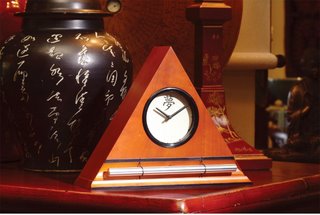 Kanji Dial Face in Honey Finish, Zen Alarm Clocks with a progressive chime
Now & Zen
1638 Pearl Street
Boulder, CO 80302
Posted in Chime Alarm Clocks, Japanese Inspired Zen Clocks, Meditation Timers, Meditation Tools, mindfulness practice, Natural Awakening, Now & Zen Alarm Clocks, zen monks
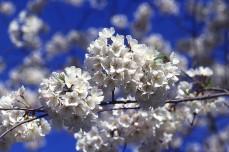 Cherry blossoms (sakura), often simply called blossoms (hana) are a common spring kigo. Kigo is a word or phrase associated with a particular season, used in Japanese poetry.
The association of kigo with a particular season may be obvious, though sometimes it is more subtle. Pumkins (kabocha), for example, are a winter squash that is associated with the autumn harvest.
It may be less obvious why the moon (tsuki) is an autumn kigo, since it is visible year round. In autumn the days become shorter and the nights longer, yet they are still warm enough to stay outside, so one is more likely to notice the moon. Often the night sky will be free of clouds so that also helps with noticing the moon. Autumn is also the time when the full moon can help farmers work under the moonlight to harvest their crops.
adapted from wikipedia.org
 Digital Zen Alarm Clock, a meditation timer and progressive alarm clock
Now & Zen
1638 Pearl Street
Boulder, CO 80302
Posted in Cherry Blossoms, mindfulness practice, Natural Awakening, Now & Zen Alarm Clocks, Zen Timers
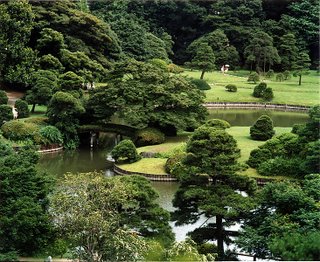 A kaiyu-shiki or strolling garden Chaniwa Gardens are built for holding tea ceremonies. There is usually a tea house where the ceremonies occur, and the styles of both the hut and garden are based on the simple concepts of the sado.
Usually, there are stepping stones leading to the tea house, stone lanterns, and stone basins (tsukubai) where guests purify themselves before a ceremony.
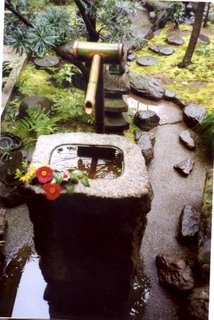 tsukubai Japanese gardens might also fall into one of these styles:
- Kanshoh-style gardens which are viewed from a residence.
- Pond gardens, for viewing from a boat.
- Strolling gardens (kaiyū-shiki), for viewing a sequence of effects from a path which circumnavigates the garden.
adapted from wikipedia.org
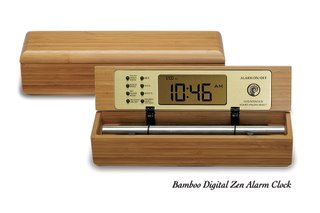 Bamboo yoga and meditation timer
Now & Zen
1638 Pearl Street
Boulder, CO 80302
(800) 779-6383
Posted in Bamboo Chime Clocks, Japanese Inspired Zen Clocks, mindfulness practice, Natural Awakening, Now & Zen Alarm Clocks, Zen Timepiece by Now & Zen, Zen Timers
« Previous Page — « Previous Entries
Next Entries » — Next Page »
|
|
|
|